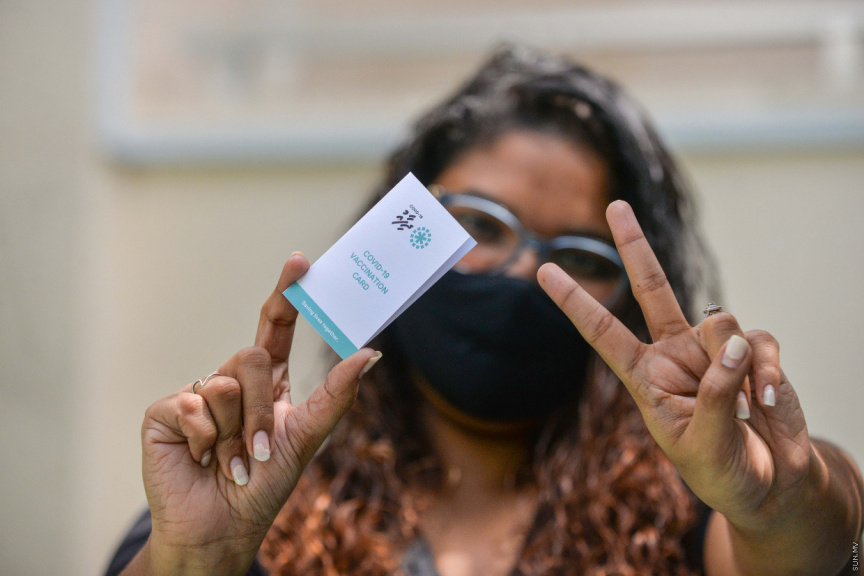
February 4, 2021: A woman poses for the camera after having received the first dose of the Covishield vaccine in the Maldives. (Sun Photo/Fayaz Moosa)
The Health Emergency Operations Center (HEOC) has stated that the number of hospitalizations in the Maldives has decreased somewhat due to the high number of vaccinations against COVID-19.
The HEOC officials in a press conference today said that despite the massive outbreak being currently observed in the nation said that the hospitalization rates were statistics used to assess the situation with the virus in the nation.
HEOC Techincal Advisory Group (TAG) member Dr. Mustafa said that the situation would be dire if the health system was overwhelmed with hospitalizations and if the number of positive cases was on the rise, the number of hospitalizations would also increase.
Dr. Nazla noted that when the situation with the pandemic in the Maldives was at its worst, the treatment facilities had reached a near 80 percent of the capacity. She said that despite the current spike in cases, the same was not happening.
She noted that 50 percent of the capacity in the Hulhumale' Medical Facility to treat the virus was still vacant and that the DH11 facility in Dharumavantha Hospital had an occupation rate of 30 percent.
Dr. Nazla said that collectively around 13-16 percent of the positive cases in the Maldives required hospitalizations.
"However, since vaccinations commenced, the severity rate has reduced by somewhat. But it also means that if more and more positive cases are being confirmed, more beds would fill up or severe cases would increase," said Dr. Nazla.

The Maldives currently has a total of 4,396 active cases with 122 hospitalizations. More than 450 cases were confirmed last night alone.
Vaccines often provide a 60-70 percent protection against the virus and full immunity is attained after around 12 weeks of the first dose. Dr. Nazla said that even if the second dose is not received on time, it did not necessarily mean that the first dose would have to be administered again.
"After 12 weeks, the protection wears off a bit, so if the second dose is not administered within 12 weeks, there is a chance that people can get sick. But it only means to get the second dose as soon as available even after 12 weeks have passed. The person does not need to get the first shot again," said Dr. Nazla.
Health Ministry State Minister Dr. Shah Mahir stated that despite the increase in cases, the vaccine campaign was running very well. He noted that around 67 percent of the eligible population had received the first dose while 30 percent had received both shots.
He also said that when compared globally, the Maldives was doing relatively well with vaccinations and that her immunity was the only way to recover the economy and cover the losses and difficulties faced as a result of the pandemic.
Minister Dr. Mahir said that there were still around 20,000 people eligible for the second dose of the vaccine who have not yet received it. He advised all of them to get the second shot as soon as possible.
"The benefits of every vaccinating are being seen. Our aim is to take the figures of vaccination to 60-70 percent within the next few months," said Dr. Shah.
The Minister also assured that the Maldives would not run out of vaccines.